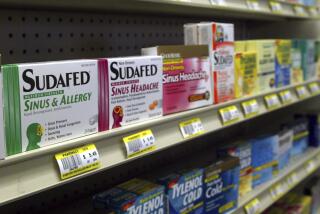Drug to Test FDA’s Risk Tolerance After Vioxx
- Share via
A regulatory review today of a potential blockbuster drug for diabetes is being viewed on Wall Street as a test case that may reveal whether the Food and Drug Administration has become more cautious about safety.
Called Exubera, the drug is an inhaled form of insulin and could reduce or eliminate the need for insulin injections -- a potential breakthrough for diabetics who must otherwise take several daily shots.
But the medication, to be marketed by Pfizer Inc., poses safety concerns. Patients in clinical trials have experienced a slight drop in breathing capacity, although Pfizer and its development partner, Sanofi Aventis, said that the decline was not significant and that lung function leveled off after a while.
The FDA’s panel of outside experts probably will focus on the long-term safety of Exubera, analysts said. The companies have completed a safety study tracking patients for two years, but little is known about the effects of Exubera on the lung beyond that length of time.
The review is taking place amid controversies about drug safety stemming from last fall’s recall of Vioxx because of cardiac risks that became apparent years after the popular drug reached the market.
Vioxx manufacturer Merck & Co. faces 5,000 lawsuits related to the arthritis pill and last month lost a $253.4-million judgment in the first Vioxx injury case to reach a jury. In Congress, the FDA came under criticism for not monitoring drug safety closely enough.
Although the Exubera panel isn’t expected to discuss Vioxx, the arthritis pill “is the unspoken elephant in the room,” said Kris Jenner, a portfolio manager with T. Rowe Price. “Everyone knows it’s there.”
The FDA isn’t required to follow the advice of its experts, but it often does.
If approved, Exubera, a powder that patients breathe through a 6-inch inhaler, would be the first inhaled insulin. It was invented by Nektar Therapeutics of San Carlos, Calif., which licensed its technology to Pfizer.
Much is riding on Exubera for Nektar, an unprofitable company that has spent millions of dollars and 15 years on the technology. The challenge was to reduce insulin to particles of just the right size to be absorbed by the lung. Very small particles would be exhaled, while large particles would be filtered out.
Exubera would be the first diabetes medicine in more than a decade for Pfizer, the world’s largest drug company. An approval would solidify its lead on competitors working on inhaled insulin, a group that includes MannKind Corp., a small biotechnology company in Valencia, and industry giant Eli Lilly & Co.
None of the companies working on Exubera would discuss the drug before the FDA panel meeting. On Wednesday, Nektar closed at $19.14, up $1.81, while Pfizer rose 43 cents to $26.30.
The main reasons to use Exubera are comfort and convenience; it isn’t better at managing blood sugar than injectable insulin. And because Exubera is a short-acting insulin, patients who need a long-acting dose at night will still require an injection before bed.
Still, Jenner thinks Exubera’s sales potential is huge -- perhaps topping $1 billion annually -- because many patients find needles inconvenient, painful and frightening. A large number of patients who become diabetic later in life need insulin but don’t take it because they are “needle-phobic,” he said.
Other analysts, including Kate Winkler of Global Crown Capital, doubt that Exubera’s advantages will prove important in a post-Vioxx world. In fact, Winkler sees the drug as similar to Vioxx, in that the arthritis pill offered few benefits over aspirin and other over-the-counter pain relievers. “In hindsight,” Winkler said in a note to investors, the approval of Vioxx was “overly hasty.”
Because diabetes is a chronic condition, patients probably would take Exubera for their entire lives, she said. “We expect regulators to take a conservative stance and require more data ad infinitum,” Winkler said.
Worries about lung damage delayed the FDA’s review of Exubera while the companies conducted a two-year safety test. Although patients using Exubera saw a 1% to 1.5% average decline in their breathing capacity, Pfizer’s studies showed that the deterioration didn’t worsen over time and reversed itself when patients stopped the drug.
The FDA’s staff, in briefing documents released Tuesday, made no recommendation to the panel for or against Exubera, which investors took as a good sign. But the agency identified safety as its No. 1 concern, particularly in patients with chronic pulmonary conditions. Pfizer is studying Exubera in patients with asthma and lung disease, but results aren’t yet available.
Diabetes specialists also are watching the FDA review. Stephen H. Schneider, a professor of medicine at Robert Wood Johnson Medical School in New Jersey, provided Exubera to patients in clinical trials. Schneider said his patients liked the drug, but they also complained that the inhaler was awkward and clunky. Safety risks appear minimal at this point, he said.
“In the first few years, we have not seen significant damage,” Schneider said. “The big concern is how long do you wait to see if you have any lung problems. There are no easy answers.”






